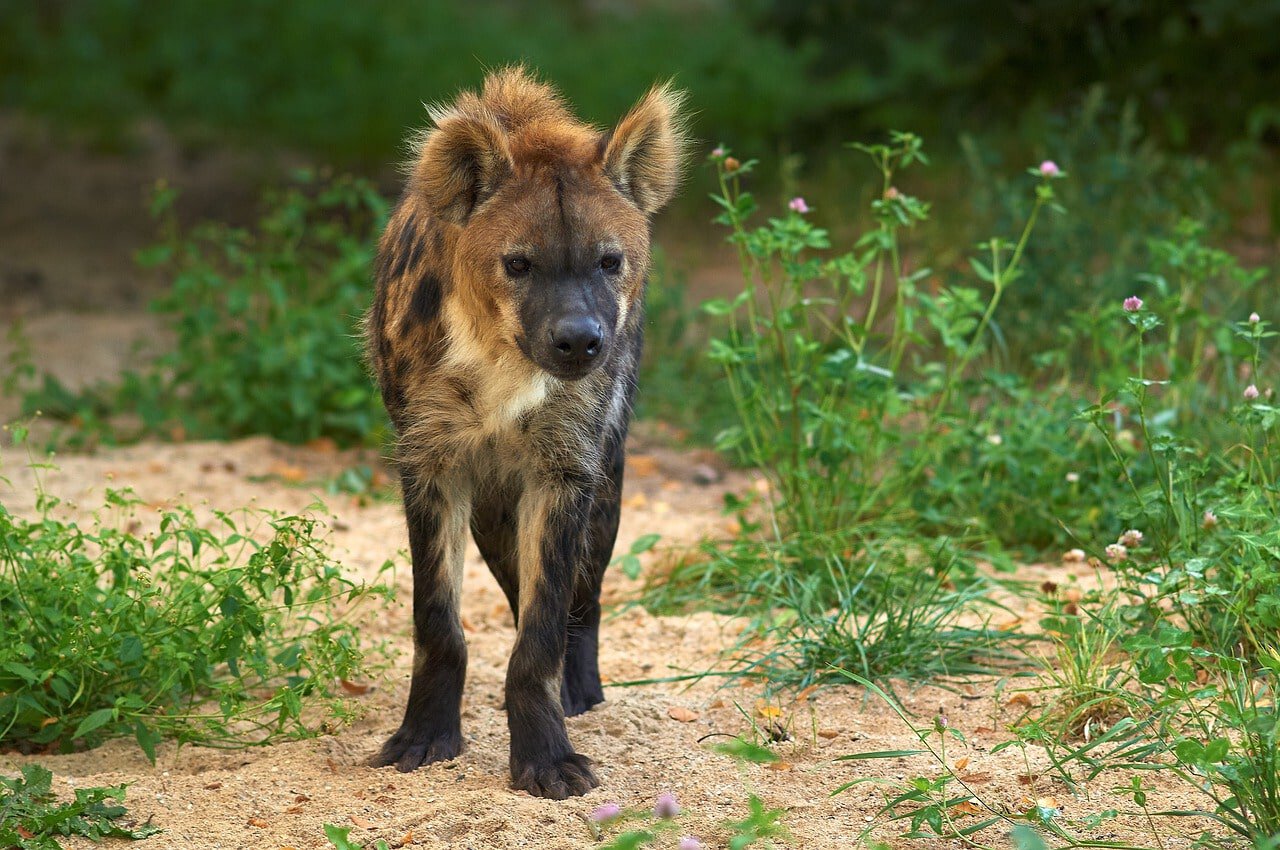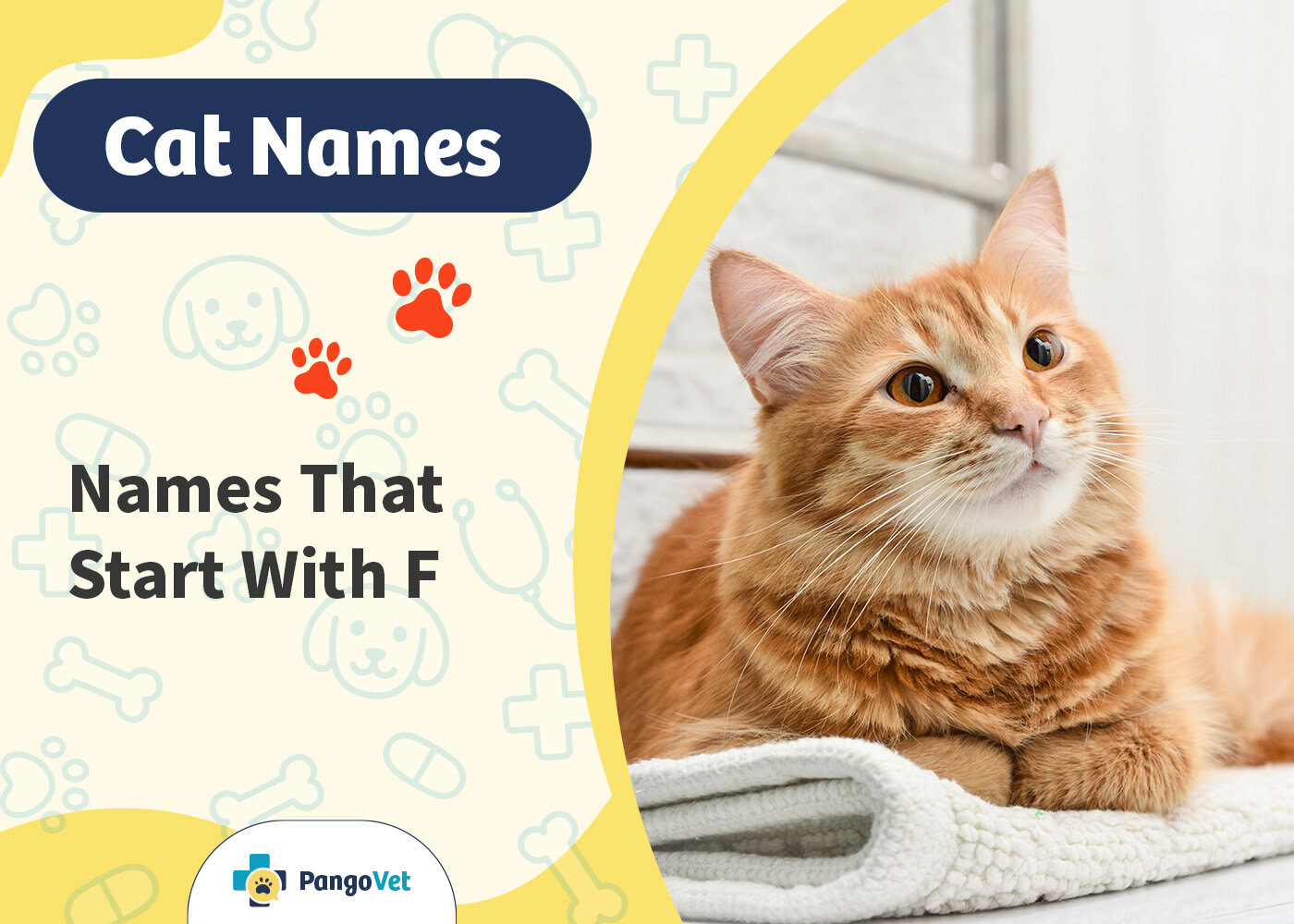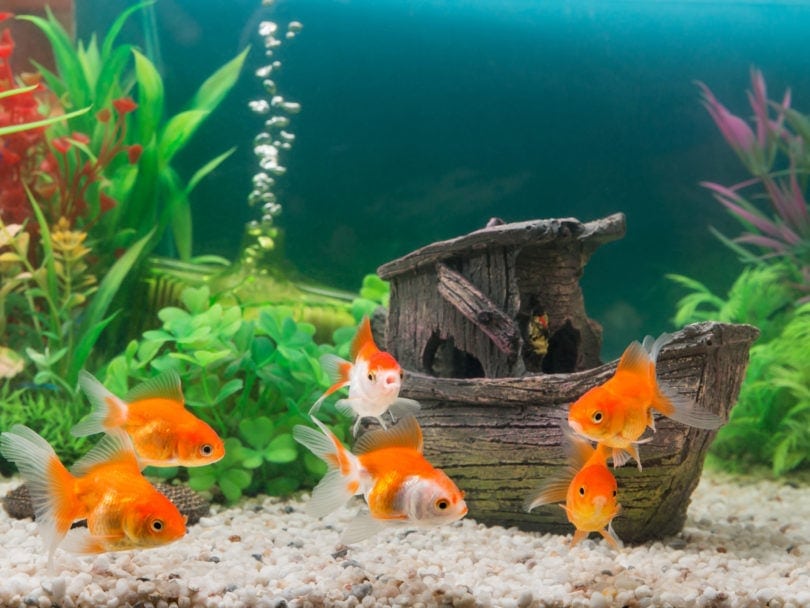VET APPROVED

The information is current and up-to-date in accordance with the latest veterinarian research.
Learn more »Click to Skip Ahead
Hyenas are a wild bunch. Not only do they look wild, but they act wild, too. That’s because they are wild—literally. But their dog-like appearance makes some wonder if they can be domesticated. Let’s get one thing clear: hyenas are not dogs and don’t make good pets. Although they may resemble dogs, hyenas are more related to felids than canines.
And yet, these facts haven’t prevented some from pursuing ownership of hyenas to keep as pets. To understand why hyenas are better left in their natural environment, we need to explore this incredible animal further.
So, join us as we reveal all the details about hyenas and pets.

The Unique Hyena Anatomy
A look at a hyena reveals an animal with a robust build. Their large heads, big ears, and sturdy necks hint at their brute strength, and their lowered hindquarters give them a distinctive profile.
The spotted hyena (Crocuta crocuta) is arguably the most recognizable species due to its unique dark spots on tan or golden fur. If you’ve heard a burst of disturbingly human-like laughter in wildlife documentaries, it’s the sound of a spotted hyena reacting to fear or excitement.
However, the truly intimidating feature of hyenas lies in their jaws. Armed with a bite force of up to 1,110 pounds per square inch (PSI) in spotted hyenas, these powerful animals can effortlessly crush animal (and human) bones1.
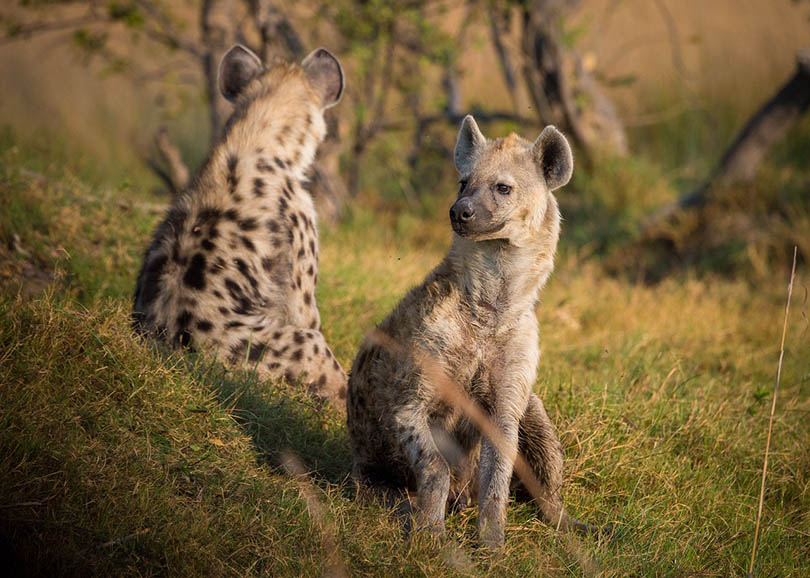
Hyenas as Pets: A Good Idea?
Given their extraordinary power and wild nature, the thought of having hyenas as pets might seem unusual, if not downright scary. The reality is exactly that: hyenas exhibit behaviors that make them unsuitable for domestication.
Young hyenas may seem playful and can form bonds with humans. Yet as they mature, their innate predatory instincts kick in, making them less safe around their human caretakers.
In other words, hyenas don’t make good pets! Their unpredictable nature and inherent hunting instincts make them risky companions, suitable only for highly experienced caregivers knowledgeable in hyena behavior. It’s also crucial to remember that every hyena is, by nature, a wild and predatory animal.
Legalities & Cost Implications of Owning a Hyena
In many parts of the world, including several states in the US, owning a hyena is illegal. Beyond the legality, there’s also the cost factor to consider. According to some sources, purchasing a hyena from a breeder could set you back anywhere between $4,500 and $9,000.
Again, having a hyena as a pet is not a wise idea.

Understanding Hyena Cubs
Hyena cubs in captivity behave differently than their wild counterparts. They’re playful, much like canine puppies, and exhibit less competitive behavior thanks to the consistent supply of food and care. What’s more, hyena cubs form packs or clans with other domestic animals if given the opportunity.
It’s important to note, however, that hyenas start showing their wild tendencies quite early. When two spotted hyena cubs are born, they will fight over which one will be more dominant, and sometimes kill their sibling. They are born with some already present and may nurse until about 1-2 years old. The survival rate of hyena cubs, particularly spotted hyenas, can be quite low due to competition.
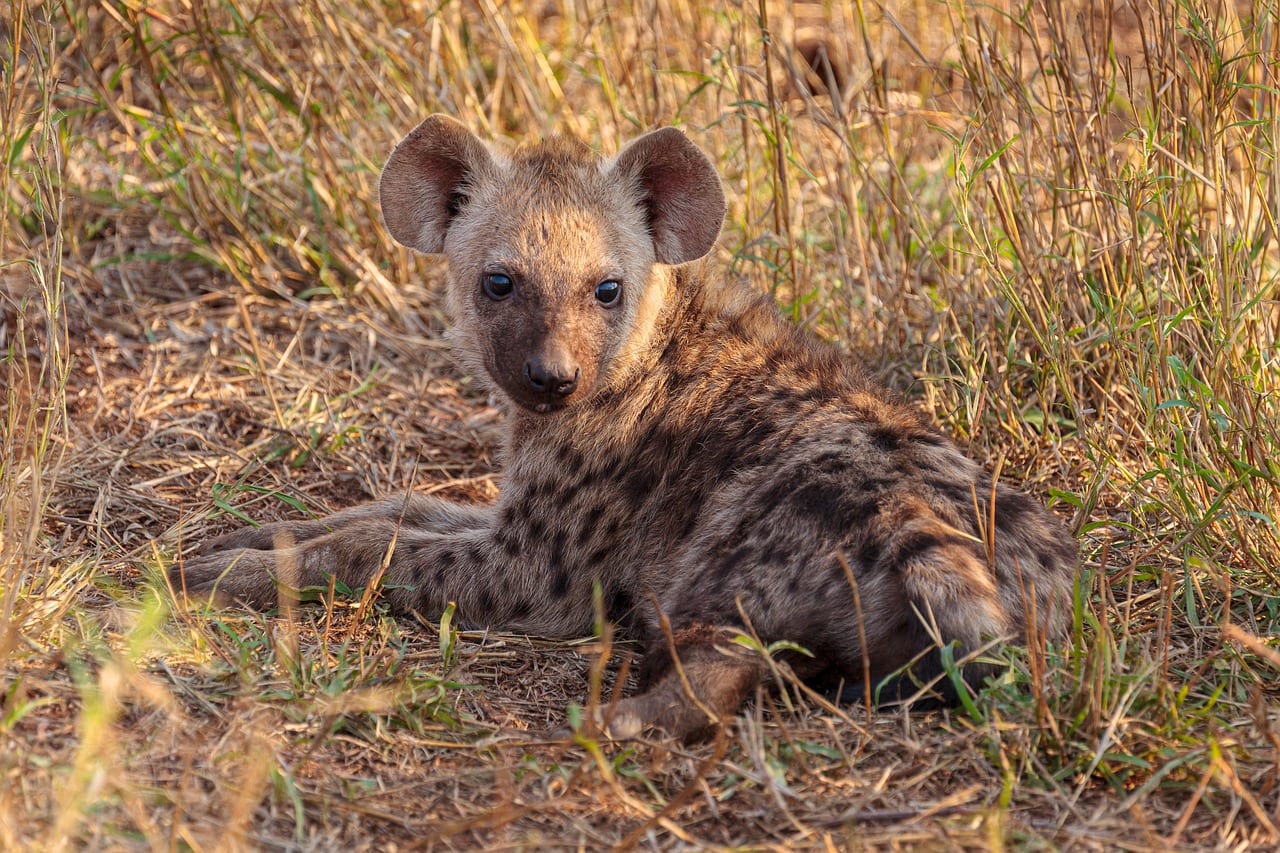
Adult Hyenas: A Force to Be Reckoned With
As hyenas mature, their behavior changes significantly. Females behave more aggressively and dominant, prioritizing the safety of their clan above all else. Particularly in the case of spotted hyenas, the females—which are larger and more aggressive than the males—lead the packs.
Owning an adult hyena as a pet can be a risky venture due to their unpredictable nature. While hyenas are not known to consider humans as prey, they might react aggressively in certain circumstances, leading to dangerous situations.

Do Hyenas Do Well in Captivity?
Hyenas are intelligent, social creatures that naturally live in large clans of up to 100 individuals. The vast expanses of the African savanna provide them with the freedom they need to thrive. As you can probably imagine, it’s challenging to replicate these conditions in captivity. Thus, many experts believe that a captive life is far from ideal for these animals.
Nevertheless, wildlife conservation organizations and sanctuaries play a vital role in the care and rehabilitation of hyenas, especially those injured or orphaned. These sanctuaries offer the best chance for these hyenas to survive and potentially return to the wild.
So while human interaction (and intervention) can play critical roles in the betterment of hyenas, there’s a limit to how far those roles should go. And even then, it’s so far removed from pet ownership that it really doesn’t even belong in the same discussion.
Overseeing a hyena’s care is an understandable venture that has its place. But that in no way should be misconstrued as a possibility of keeping a hyena as a pet.
Tips for Raising a Hyena Cub Before Release into the Wild
While the preference is to let wildlife be wild, certain situations may warrant a period of human care. Perhaps a hyena cub has been orphaned or injured, requiring rehabilitation before being able to survive on its own.
However, it’s crucial to remember that the ultimate goal is to reintroduce the animal back into its natural habitat once it has recovered and is ready. Here are some tips to facilitate this process:
- Involve Professionals: Involving trained wildlife rehabilitators or veterinary professionals is a must when caring for a hyena cub. They have the knowledge and experience to handle the unique challenges of raising a wild animal.
- Provide an Adequate Diet: Hyenas are social carnivores, and a cub needs an appropriate diet for proper growth and development. Feed the cub a balanced diet consisting primarily of meat under the guidance of a professional.
- Medical Care: Ensure that the hyena cub receives all necessary vaccinations and regular health check-ups to prevent diseases and parasites. In addition, any injuries should receive immediate attention from a veterinarian.
- Minimize Human Interaction: To help the hyena retain its wild behavior, limit human interaction as much as possible. The more human contact a cub has, the harder it will be for it to reintegrate into the wild.
- Simulate Natural Living Conditions: Try to create an environment that simulates the hyena’s natural habitat. This includes providing plenty of space for physical activity and, if possible, interaction with other hyenas.
- Safety Measures: Remember that a hyena cub is still a wild animal with strong instincts. Safety measures should be in place to protect both the hyena and the caregivers.
- Release Plan: Coordinate with wildlife experts to develop a release plan. Factors such as the hyena’s health, age, and the season must be considered.
While it is possible to raise a hyena cub before releasing it into the wild, it is a task best undertaken by professionals or under their guidance. This ensures the health and safety of the hyena and minimizes potential risks to humans.


Conclusion
Hyenas certainly can be fascinating creatures, given their unique characteristics. But we have to remember that they are wild animals, not pets. That means they thrive best in their natural habitats, not in domesticated environments.
Their predator instincts, unpredictable nature, and legal restrictions make them unsuitable and unsafe for home ownership. So, let’s just appreciate these remarkable creatures from a safe distance and leave their care to experienced professionals and wildlife rescuers.
See also:
- https://www.krugerpark.co.za/Kruger_National_Park_Wildlife-travel/kruger-park-wildlife-hyenas.html
- https://www.nationalgeographic.com/animals/mammals/facts/spotted-hyena
- https://www.rosecitydentalcare.com/post/who-has-the-strongest-jaws-in-the-animal-kingdom-with-your-portland-or-family-general-dentist#:~:text=Spotted%20Hyenas%20have%20a%20fearsome,force%20of%20about%201160%20PSI.
Featured Image Credit: Jaroslav Španko, Pixabay
